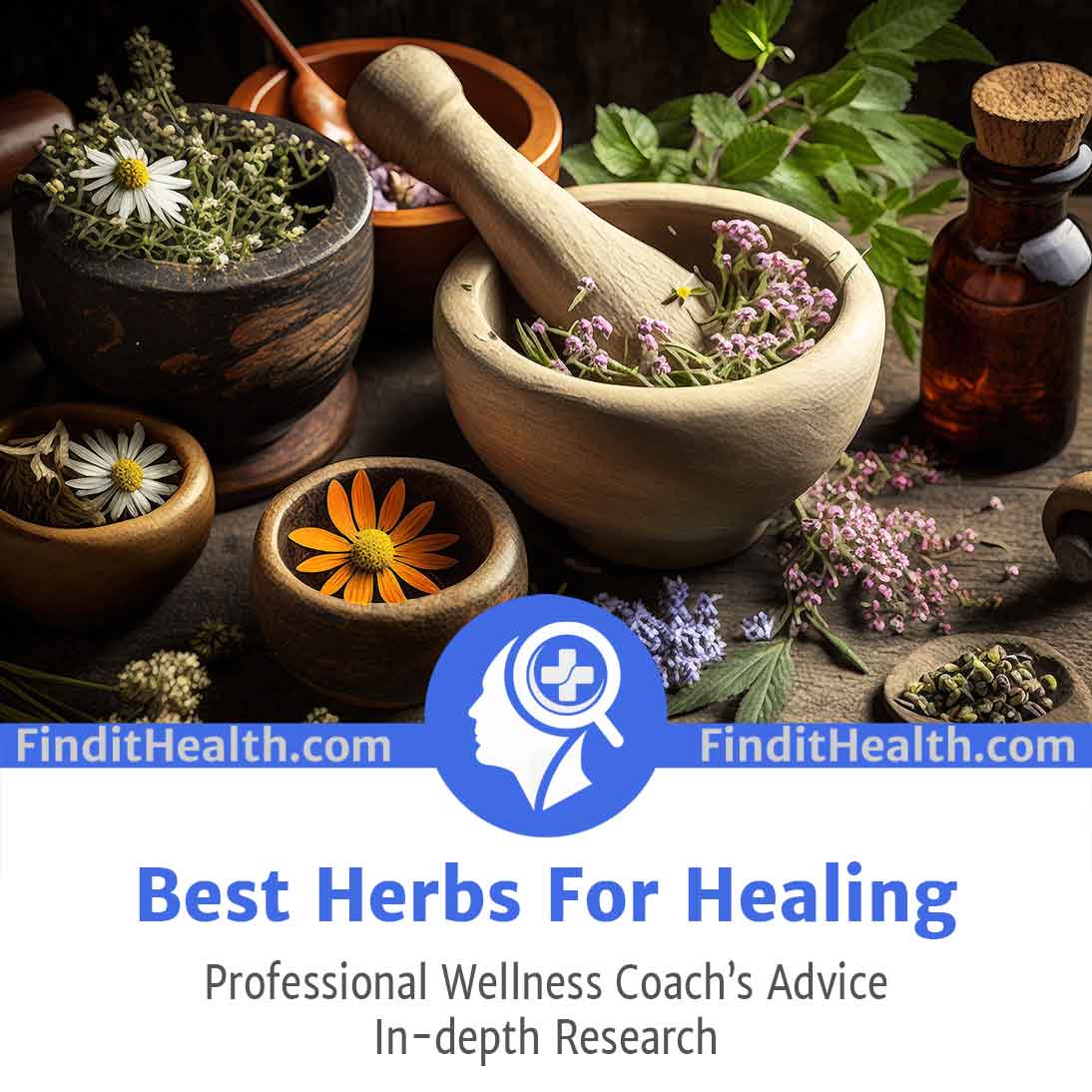
As the leader of the wellness group here at Find It Health, I will provide a detailed explanation of the most effective healing herbs. We always work around the clock to give you up-to-date and credible information.
The purpose of this article is to provide readers with an overview of the best medicinal herbs to grow, their herbal healing properties, how to choose the perfect medicinal herb list, and how to grow medicinal plants in your garden.
Best Medicinal Herbs To Grow
The best healing herbs to grow include:
1. Passionflower
Passionflower is a natural vine that grows in the southeastern United States. This plant has attractive foliage and gorgeous flowers. The vine can easily grow anywhere with a trellis or a wall to climb. Its flowers and leaves are vital nervine sedatives. They help alleviate pain, including headaches, joint pain, and menstrual cramps, and promote natural sleep.
You only need to plant these medicinal herbs in average to well-drained garden soil. In addition, this perennial herb needs a spacing of 3 feet apart. They are capable of climbing up to 5 feet or more.
Its flowers, leaves, and stems all have healing properties. They can be used in tincture or passionflower tea while still fresh or dried.
2. Pot Marigold/Calendula
This is a common herb with sunny orange or cheerful yellow flowers. Its petals are consumable, and its flower has medicinal properties that help heal skin health conditions.
You can add calendula flowers with their resinous green bracts to salves, soaps, and topical oils to help heal dry skin, wounds, burns, and rashes. In addition, this perennial plant is one of the ingredients in several diaper rash creams and ointments.
Calendula herbs are best as a container plant with average garden soil with full sun.
3. Cayenne
This is a hot red pepper that helps in spicing foods. Cayenne also helps in treating circulatory problems, and it’s also best in stopping bleeding. Since this is a hemostatic herb, it also helps slow or even stop heart attacks before getting assistance from a professional.
4. Holy Basil
This is an anti-microbial and highly aromatic plant. Moreover, its flowers and leaves help to treat coughs, headaches, respiratory conditions, asthma, diabetes, colds, bronchitis, stress, sinusitis, anxiety, and arthritis pain. In addition, the adaptogenic property offers uplifting energy levels and assists with brain function, focus, and clarity. You can add its fresh herb leaves to salads.
This aromatic herb needs an average to wet garden soil and a spacing of 1.5′ apart.
5. Garlic
Garlic medicinal herbs help treat sore throats, flu, digestive issues, and colds. Moreover, this herb helps ease autoimmune diseases by stimulating and enhancing white blood cell production.
In addition, garlic has antibacterial and antiseptic properties. The herbs also help in purifying the blood and improving blood circulation. In other cases, it’s used to regulate blood sugar levels. Its delicious flavor makes it be used as a spice in many foods.
6. Peppermint
Peppermint is very easy to plant, and it can grow almost everywhere. This culinary herb has a spicy, pungent odor making it a popular culinary additive to several candies and foods. Peppermint helps in improving digestion and eliminating flatulence (gas). Furthermore, it also has mild antispasmodic properties, hence it is very helpful when experiencing menstrual cramps.
SUBSCRIBE for FREE STRESS MANAGEMENT TECHNIQUES from our EXPERT COACHES!
Healing Properties
1. Basil
This herbal medicine has anti-inflammatory, anti-bacterial, and anti-stress properties. Basil herbs help relieve pain, immune boosters, blood vessel protectors, etc. In addition, the flowers and leaves of this adaptogenic herb are used as a medicinal tea. This helps treat colds, asthma, coughs, bronchitis, headaches, sinusitis, arthritis pain, anxiety, diabetes, and stress. Basil’s adaptogenic effect helps with improving brain health.
2. Stinging Nettles
Stinging nettles are rich in minerals, chlorophyll, and vitamins, including Vitamin C, Vitamin A, calcium, magnesium, potassium, and iron. Moreover, the seeds and leaves help treat allergies, kidney tonic, and arthritis pain.
3. Peppermint
Peppermint herbal teas help soothe stomach issues, including cramping, indigestion, gas, vomiting, bad breath, colic in babies, and upset stomach.
4. Southern Ginseng
The leaves of Southern Ginseng are brewed to be a medicinal tonic tea. This helps relieve anxiety, depression, stress, high cholesterol, and high blood pressure.
5. Cayenne Pepper
Cayenne helps in supporting digestion by preventing blood clots. Moreover, it also helps relieve migraines, joint pain, and nerve pain, promotes detoxification, supports weight loss, and improves allergy symptoms.
6. Milk thistle
It helps improve liver disease conditions, reduces cholesterol levels, and has anticancer properties.
7. Gingko
Ginkgo’s leaf extract helps treat different conditions, including asthma, fatigue, bronchitis, and tinnitus. Furthermore, it also helps in improving your memory.
8. Echinacea
Echinacea can improve your immune system and decrease the risks of getting a common cold. It also helps relieve pain, decrease inflammation, ease constipation, and improve skin health concerns.
SUBSCRIBE for FREE STRESS MANAGEMENT TECHNIQUES from our EXPERT COACHES!
How To Pick A Healing Medicinal Herb
Consider the factors below to pick the best healing medicinal herb that suits your needs.
Understand Your Specific Health Issue
It is important to understand the health problem you wish to address. This can range anywhere from respiratory infections and stomach problems to anxiety and wound healing. Keep in mind that different herbs target different health conditions and offer distinct medicinal benefits.
Medicinal Properties
After identifying your health issue, you must properly research the herb’s medicinal properties on your favorite resources. Consider herbs previously used to treat the common condition you’re having.
Herbs Source
Herbs can be home-grown on farms or wild-foraged. Its source affects its potency and purity. Always consider wild-crafted or organic herbs.
Herbs Preparation
Herbs preparations and the most suitable method for consuming them are also important. The preparation method will determine what it’s used for, how long it lasts, and its shelf life. Some of the preparation includes capsules, infusions, tinctures, poultices, powders, balms, and salves.
Herbs Potency
Check the brand’s manufacturing and processing practices to know about the herbs’ potency. You can also seek guidance from professionals and health food stores. In addition, you can also check on what other customers say about their experience with the product.
Safety And Possible Side Effects
Before choosing a herb, check its safety and the possible side effects. Some herbs cause allergic reactions and interact with other medications. Moreover, others will have adverse effects when consumed for long or in large doses.
SUBSCRIBE for FREE STRESS MANAGEMENT TECHNIQUES from our EXPERT COACHES!
Medicinal Herb List
- Calendula/Pot Marigold
- Motherwort
- Passionflower
- Lavender
- Sage
- Dandelion
- Chives
- Cilantro
- Aloe Vera
- Ashwagandha
- Astragalus Root
- Echinacea/Purple Coneflower
- Holy Basil/Tulsi
- Elderberry
- Oregano
- Ginger Family
- Ginseng
- Gotu Kola
- Meadowsweet
- Jiaogulan/Southern Ginseng
- Spilanthes/Toothache plant
- Stinging Nettles
- Wild Bergamot
- Fennel
- Fenugreek
- Feverfew
- Fingerroot
- Plantain
- Horny Goat Weed
- Kava Root
- Lemon Balm
- Lemongrass
- Licorice Root
- Maca Root
- Valerian Root
- Vanilla Extract
- Vervain
- Vitex
- Wild Yam
- Witch Hazel
- Yarrow
- Marigolds
- Milk Thistle
- Mint Family
- Moringa
- Mugwort
- Mullein
- Oregano
- Paprika
- Parsley
- Peppercorns
- Pimento
- Pine Bark
- Psyllium Husk
- Sorrel
- Tarragon
- Thyme
- Triphala
- Tulsi
- Turmeric
- Clover
- Rhodiola
- Rosemary
- Oregano
- Anise Hyssop
- Tulsi
- Elecampane
- Dill
- Saffron
- Sarsaparilla
- Nutmeg
- Peppermint
- German Chamomile plant
- Comfrey
- John’s Wort
- Ginkgo biloba
SUBSCRIBE for FREE STRESS MANAGEMENT TECHNIQUES from our EXPERT COACHES!
Medicinal Plants To Grow At Home
1. Turmeric
Turmeric is among the most powerful herbs available on the planet. These medicinal herbs are used as antidepressants, arthritis medications, anticoagulants, anti-inflammatory medications, skin condition treatment, and cholesterol regulators. In addition, it helps in weight loss, treating gastrointestinal problems, and easing pain.
2. Lemon Balm
Lemon balm is another medicinal herb to consider planting at home. This herb is strong, effective, and still gentle to kids. Crushing lemon balm leaves and inhaling its fragrance helps in relieving stress. Other medicinal benefits of lemon balm include eliminating stomach upset, promoting sleep, reducing fevers, calming nerves, soothing coughs, and easing colds.
3. Sage
This is another popular herb that offers several health benefits around your home. Sage will not only keep the mosquitoes away from your yard naturally, but it also helps soothe various ailments.
This annual plant is rich in antioxidant properties, minerals, and vitamins. Other medicinal benefits of sage include helping digestion, reducing menstrual pain, easing toothache, releasing gas/bloating, easing menopause symptoms, and calming sore throats.
4. Bergamot
It’s also known as bee balm and features antifungal, antimicrobial, antibacterial, and anti-viral properties. Some medicinal benefits from bergamot include easing sore throats and coughs, calming cramps and stomach aches, decreasing bloating, easing headaches, and soothing skin.
5. Aloe Vera
Aloe Vera needs direct sunlight and well-drained, moist, or dry soil. This native plant is edible, although it tastes the worst. Aloe Vera sap is very helpful since it helps decrease the risk of getting infections and speeds up wounds, burns, and cuts healing. It also helps in decreasing inflammation. This herb can be used externally for skin treatment and internally to treat ulcerative colitis, poor appetite, chronic constipation, and digestive issues.
6. Lavender
Lavender helps in calming your body to have a good sleep. The herb also has anti-inflammatory and antiseptic properties, which help in healing bug bites and minor burns.
This native plant is easy to care for in your garden because it’s deer-resistant and drought-tolerant. Other medicinal benefits include calming your nerves, easing menstrual pain, easing headaches, and calming skin irritations.
Conclusion
In light of the research by the Find it Health team, herbs can relieve or prevent some health conditions when introduced into our daily lives. Those who are averse to prescription medications will find it the best option. Almost all herbs for healing are small plants that can survive almost anywhere, including in your herb garden. Some herbs will thrive in a trellis, while others will survive in an open field.

